Schlagwort: ‘Norwegen’
Becoming a Commercial Diver at NYD
- Maschinenbau B.Sc.
- Norway, Fagerstrand
- NYD (Norsk Yrkesdykkerskole)
- 11/2024 – 03/2025
Diving has been a life long passion of mine and thanks to Erasmus+ I had the chance to combine it with my studies in mechanical engineering to go to Norway for four months to become a Commercial Diver at NYD (Norsk Yrkesdykkerskole).
I got to spend a beautiful winter across the Fjord from Oslo in a small town called Fagerstrand filled with around sixty upcoming and eager divers from all around Scandinavia and the world.
The first two weeks were the basic theoretical foundation for diving: physics, medicine, first aid, seamanship, usage of diving equipment, fire hazards, decompression tables and pressure related effects of breathing gases. Everyday we learned about new subjects and gathered in groups to study and work on the assignments.
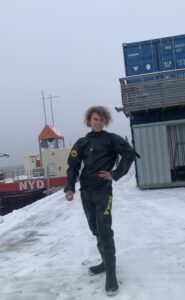
©Andreas Pietzcker
Before we could start diving we had to pass a medical check, fitness tests and a chamber dive to 50 meters to test our nitrogen tolerance. Breathing nitrogen at high pressures leads to the so called Nitrogen Narcosis or „Rapture of the Deep“. Usually the symptons set in at 30m and feel a bit like being drunk. The narcosis gets stronger the deeper you go (divers call this the Martini effect), so naturally at 50 meters we were in quite a cheerful mood. The air felt viscous due to the high pressure, you felt the high breathing resistance and most notably it changed your voice, making all of us sound like Donald Duck.
So naturally we sat in the cramped chamber bursting with laughter.
The first day of diving was filled with excitment. New equipment, check lists, for a few of us the first time they would ever get to experience the feeling of weightlessness underwater. I had been diving since I was twelve but this was a whole different world for me. Our equipment weighed in at around 30 kilos and we were glad when we climbed down the ladder into the water and could finally float.
Then we practized our bouyancy, an essential skill, to maintain a neutral position and neither sink nor ascent to the surface uncontrolled. We learned how to rescue an unconscious diver and bring him back safely, how to operate the winch to heave him out of the water and get him on a stretcher to perform first aid.
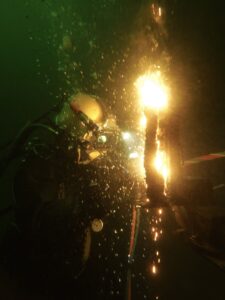
©Andreas Pietzcker
We were diving from Buldra, a dynamic positioning vessel (DPV) which uses it’s thrusters to maintain a fixed position in the water with pinpoint accuracy allowing divers to work safely. After a week of familiarizing ourselves with the equipment we took Buldra out to sea and dove from the wet bell. The wet bell uses the same principle as the first diving bells; it creates an air pocket within the bell with an open bottom, which allows divers to leave and return. In case of equipment failure the air pocket is our safe haven. During these dives we performed several inspection tasks on the bell, checking for example the electrical connections or the shakles used to attach the bell to the guide wires. The deepest dive with the wet bell was to 27m.
The next two weeks we learned about diving from the dry/closed bell and the transfer under pressure. The difference between the wet bell and the dry bell is, that on the dry bell we have a hatch which allows us to seal the bell on the bottom and maintain the bottom pressure while the bell is going up to the surface, whereas the wet bell’s pressure is always equal to the surrounding pressure.
The advantage is that the divers can be safely transferred under pressure (TUP) to a surface chamber, where they can decompress. The closed bell is used for deeper dives and saturation diving. On the station our worktask was to assemble different pipes using flanges to build a simulated distribution block for oil.
We learned about rigging and operating whinches. Underwater we guided them into place by making fine adjustments with a chain hoist and carefully positioning each part. We made sure the connection would not leak by using rubber gaskets and then screwed the pieces together using bolts. Especially important for making a good connection was the proper tightening of the bolts, where we did several passes tightening them little by little and always crosswise to make sure the pipes were properly connected.

©Andreas Pietzcker
Then we learned the use of lifting bags. Our goal was to lift a steel structure weighing about one metric ton. To figure out the weight we dove and took measurements of all the H-beams that make up the steel table. We worked out a total weight of nearly 950kg.
To prevent an uncontrolled ascent of the load we first rigged the table to a so called dead-mans-anchor. If we would fill the lifting bag to its total capacity the load would rise to the surface uncontrolled, where the bag would turn over, dump the air and come crashing down onto the divers. The dead mans anchor prevents this. This is just one example of the many things we learned about proper rigging, how to connect shackles and make sure they are loaded properly.
We filled the lifting bag and when we saw to table beginning to rise we could lift it with our bare hands and move it along the seabed.
We were also working on the pillars that make up the pier. We constructed a wooden frame underwater to be able to pour concrete. For the frame we cut 2×4 wood pieces into the correct length and profile of the bottom. To install rebar we used a pneumatic rock hammer drill to drill into the granite seabed. One diver operated the drill and the other diver guided the tip of the drillbit using a so called “Sea mans wife”. The drill we used uses around 60 liters of air per second. Which meant a whole lot of bubbles for us which made it rather difficult to see where we were drilling.
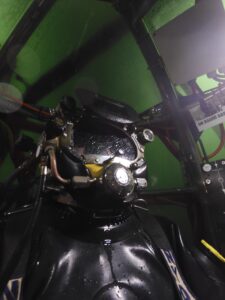
© Andreas Pietzcker
We learned how to use the AH3 and AH5 (air hat) free flow helmets. Their design is based on the old diving helmets like the Siebe Gorman whose history stretches back over a century. The difference of a free flow helmet is that there is a constant supply of air to the diver instead of a demand system, where air is supplied only when the diver breathes.
The helmet is connected to the dry suit and excess air has to be dumped with a valve that can be operated by pushing it with the side of your head. Again we were working on the concrete pillars, excavating and cleaning away the surrounding seabed to expose the bedrock. For cleaning we used an air lift which sucks away material using a difference in pressure and high and low pressure water jets as well as shovels to move material.
At around 15m there was an old steel tank which had been encrusted with barnacles and other types of sea life. We cleaned the tank using a hydraulic brush and got it nice and shiny again. As you would have expected of a group of guys, while we cleaned the surface we used parts of it for our own artistic expression.
We continued with deep dives up to 50 meters which also is the maximum depth a diver can work at breathing air because of the toxic effects of nitrogen and oxygen at these high pressures. We also did surface decompression. After deep and long dives the body builds up nitrogen which has to be released slowly or bubbles form in the divers blood which can have fatal consequences. To avoid this divers do decompression stops, which can be impractical because of long times in freezing water or waves. Surface Decompression works by lifting the diver quickly out of the water and recompressing them to a depth of 15m where they start breathing pure oxygen. To avoid bubbles from forming this has to happen quickly, within five minutes.
One of the most exciting things to learn about was underwater wet welding. Using specially made electrodes we practiced fillet welds and T-joints. Underwater welding is very different from welding on land, because the weld cools extremely quickly and has a tendency to crack if one works to fast. After joining a lot of steel plates together it was time to take them apart again by oxy-arc cutting. And electrode is ignited and supplied with a steady stream of oxygen which enables and exothermic reaction so that the tip of the electrode burns at around 5000 degrees celsius. This made short work of the steel plates which melted away like butter. It was an incredible experience to stand less than half a meter away from this bubbling and glowing metal next to a stream of smaller and sometimes larger explosions if a pocket of hydrogen gas had formed.
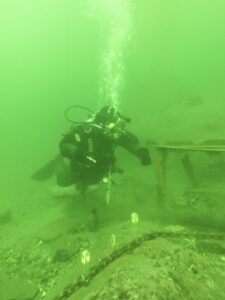
© Andreas Pietzcker
Lastly we trained on using Scuba gear and the Interspiro mask. This is the equipment used mostly by firemen and rescue divers and we practiced search patterns for lost objects (we had a chain and, of course, a gun), rescuing an unconscious diver, did inspection dives and cleaned the hull of the dive vessel Buldra, where we had started to dive all the way back in November.
It sounds crazy but diving into freezing water with equipment that weighs nearly as much as you do, is an amazing and fun experience. It is truly something extraordinary, the feeling of floating weightlessly in the water or walking with lead boots along the seabed like the astronauts on the moon.
Diving is a team effort and I was priviledged to work with some amazing, caring and professional individuals during this four month stay. We grew together as a group and took care of each other.
Every day there were new challenges and new things to learn and new experiences, so every morning I was glad to go there. And in the evenings we met, cooked and laughed together, watched movies, had barbeques or went out to Oslo to party.
There are so many different aspects to diving that it is hard to put into words but in essence it is a gateway to a truly unique world where adventures await. I will never forget the time I spent in Norway nor the lessons that I have learned and I am hoping that this will just be the beginning of an incredible journey. I want to thank Erasmus for giving me this opportunity and I will cherish these memories for a long time.
Writing my Master Thesis in Trondheim
- Chemistry M. Sc.
- Norway, Trondheim
- Norges Teknisk-Naturvitenskapelige Universitet
- 07/2024 – 01/2025

Figure 1: Cross-country skiing on Finsevatnet in Finse, mid-January. ©Julia Wang
Preparations
People often ask for the reason I chose Norway: Initially, I planned to do an internship in Sweden and then return to Germany for my thesis. Unfortunately, I lost contact to my Swedish prof, and as time was running out, I finished all required internships in Germany. However, I struggled to find a suitable thesis topic, so I decided to write it externally, including universities from countries in Ireland and Scandinavia in my search. I wanted to improve my English skills and also experience a place full of nature I have never been to before. As the nature in Ireland, Sweden, Norway, and Finland is beautiful, I ultimately found that Norway was the best fit for me. It offered a fascinating language but still with the comfort to speak English anytime, stunning landscapes, beautiful nature, a vibrant student city, and an exciting thesis topic.
I came across the topic of my thesis by proactively reaching out to professors working in areas I found particularly intriguing. As a chemistry student, I was often dissatisfied with the specializations at my university, so learning that Norway has a strong focus on environmental chemistry caught my attention. After a response from a professor, we had a brief meeting where he introduced me to a project based within the Arctic Circle, combining environmental chemistry with fundamental research. The process of signing the OLA was incredibly slow, but once that was finalized, there was nothing standing between me and my successful thesis – well, except for one thing: accommodation.
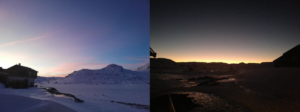
Figure 2: Stunning sunset in Finse, mid-January. ©Julia Wang
Accommodation & Living expenses
Overall, Norway is more expensive in nearly everything, which makes sense given their higher income. Usually, it is possible for exchange students to apply for student dorms (e.g. at Moholt). Those are particularly nice because of the large student communities that make it easy to meet new people. However, since I arrived in the winter semester – when most new local and exchange students come – the dorms were fully booked. As an internship student from Europe, I wasn’t automatically eligible for housing, so I had to request dorm accommodation. Even then, priority is typically given to international students from outside Europe and those attending summer courses at NTNU.
Thus, I ended up looking through the private housing market. Luckily, I found a room in a Norwegian student’s flatshare that was subletting for the exact duration of my stay. The flatshare with 4 people was comparably affordable and with 5300 NOK (everything included) even cheaper than the dorms. My place was located near Solsiden, which wasn’t exactly close to the university, but the area was well-connected by buses. It was also closer to the city center, as Tyholt and Moholt were about a 25-minute bus ride away. Personally, I preferred cycling since it is faster, cheaper, and the terrain was less steep compared to Gløshaugen-Moholt, which was a nice bonus.
As for the general living expenses, being a vegetarian made it a bit challenging to find affordable fresh vegetables, as everything tends to be more expensive and often heavily packaged in plastic. However, you get used to the prices after a while. As someone who loves tofu, I found it difficult to find good, firm Asian-style tofu. Common supermarket chains include Rema1000, Bunnpris, and Coop Mega for cheaper options, while Kiwi and Meny are more expensive. There are also online discounts and QR codes that offer discounts on specific products, and it’s helpful to ask around in ESN groups, as they often share these codes. I also found myself visiting Asian markets, like NM Market for the best deals on rice, soy sauce, and paneer at Melon Midtbyen. In general, products with higher fat, sugar, or imported goods were about twice as expensive as in Germany. However, Norwegians tend to offer larger packaging, which can help reduce the price per unit.
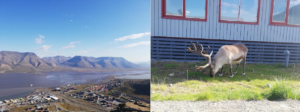
Figure 3: Parts of Longyearbyen and the Adventfjorden from the Varden viewpoint (left) and Svalbard reindeer in the middle of town (right). ©Julia Wang
Everyday life/the internship
Since I was doing my master thesis, my workload was higher compared to an average exchange student. I did miss out a bit on some activities since I was less flexible and had less free time. However, Norwegian work culture is much more chill and laid back than back in Germany. Nobody will ask you to come early and nobody cares if you leave early. Therefore, you need even more discipline to stay on track. Typical work hours in Norway are from 8am to 4pm. Afterwards, people head home for dinner. Many shops also close around 4 or 5 pm, so it’s a good idea to check their hours in advance to plan accordingly.
My thesis involved a field trip to Svalbard in mid-August, where I collected samples, spent time in the lab back In Trondheim, and then focused on writing the thesis. The working groups at NTNU are pretty small, so it is easy to get an overview but I rarely met everyone at once. Knowing how close people work together in working groups in Germany, sometimes I felt a bit lonely and disconnected from PhD or master students. However, I also enjoyed the independence I had to plan my own research, discuss it with my professor (who, by the way, dedicated a lot more time to me than the average professor in Germany would for a master’s student), and work closely with my supervisor. I also enjoyed the flexibility in how I structured my daily work and writing process.
In the evenings, I usually took part in various free-time activities including choir, anime screenings, board games, swimming, 3D printing, sewing, knitting, or baking. On weekends, I usually met up with friends, did my chores, or went on hikes and trips around the area. Sometimes, and further. With a bit of planning, you can easily bring your work with you, as many trains offer Wi-Fi! That way, you can explore places like Åndalsnes, Bergen, Finse (!!!), and more.
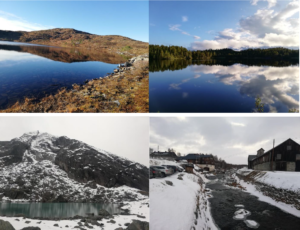
Figure 4: Stunning lakes and rivers found during hikes across Norway. Grytvatnet is found close to Vinjeøra, (upper left), Stordamvatnet is close to Lundamo (upper right), Hurrungsvatnet is near Åndalsnes (bottom left), and the Glomma river runs through Rørøs (bottom right). ©Julia Wang
Free time/tips
Trondheim is a big student city, so you will find all kinds of people. While connecting with international students was quite easy, since everyone is desperate to find friends, I was more interested stepping outside the Erasmus bubble and meeting Norwegians. And the stereotype holds true: While Norwegians are friendly and somehow open to start a conversation, there can still be a sense of distance. Personally, I’ve never been the most social or chatty person, so I always struggled to form deeper connections with anyone. That said, living with Norwegians and joining Norwegian clubs really helped me engage more with locals.
Norway is known for its stunning and beautiful nature (northern lights, midnight sun, mountains, fjords, lush green forests wherever you go!) and almost all Norwegians are big sports enthusiasts. NTNU has a student organization called NTNUI, where you can sign up for various sports clubs. Its very close to what American sports teams are like. People are competitive and passionate about their activities. If you want to try something typical Norwegian: You can join a group that teaches halling, a traditional Norwegian dance, or even take up sword fighting through another separate group.
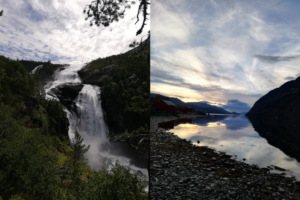
Figure 5: Because scenary with water is so beautiful: The stunning Nyastølfossen is found close to Kinsarvik on a 3-4 waterfall hike (left) and the beautiful sunset over Vinjefjorden can be observed in Vinjeøra (right). ©Julia Wang
If you are not into sports, there are still many student groups you can join: As for me, I joined a group called PVV for board games and anime. In general, they have a different focus but they also offer great social activities. I also joined a choir (NTNU motettkor), conducted by one of Norway’s most famous conductors and a group of Norwegian music students. The group was a fun mix of exchange students and locals, and the conductor was incredibly motivating, making it a truly enjoyable experience. Another popular hobby in Norway is knitting, with knitting events often hosted at cafés or yarn shops. It’s a relaxing activity, especially on those cold, rainy days. I also had the chance to learn 3D printing and practice sewing at the MakeNTNU workshop, where you can book time on a machine to create whatever you like (They are getting new printers, finally!!).
Another great place that offers cool events is the student building down the road from the technical university building: Studentersamfundet. It is definitely worth a visit, as they offer concerts, talk shows, discussions, I addition to having restaurants and more.
As for Trondheim, nature is incredibly accessible. You can enjoy small walks along the coast to the fjord in Lademoen, hikes in Estenstadmarka to the southeast, or head to Bymarka to the west. In winter, Bymarka is perfect for cross-country skiing. For bigger adventures, the ESN group organizes trips to Lofoten, Lapland, and other places. Otherwise, it is advisable to form small groups and rent a car to get around, especially in winter. While many people opt for Airbnbs, I highly recommend trying the great network of cabins in Norway! NTNUI Koiene have basic cabins around Trøndelag but personally, I suggest going for the DNT cabins as they are more spacious and comfortable.
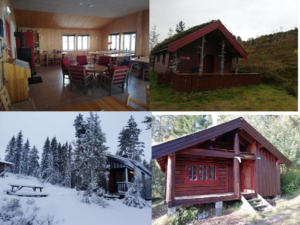
Figure 6: The common room in the DNT Brebua cabin in Finse (upper left), the DNT Venjedalsbu cabin close to Åndalsnes (upper right), a private cabin at Bymarka close to Ringvål (bottom left), and the Flåkoia NTNUI cabin near Lundamo (bottom right). ©Julia Wang
Conclusion
If you are an outdoor enthusiast who enjoys nature and want to experience a new culture during your internship or your thesis with excellent supervision and a nice work environment, I definitely recommend Norway. Not only did I gain insight into the country and its people, but I also embraced a new way of living my life while staying productive. There are plenty of opportunities and activities that allow you to connect with others. You just have to step out of your comfort zone and start engaging people!
I hope you enjoy your time here as much as I did if you choose Norway.
P.S. Yes, it does get pretty dark and depressing from November to February (Average daylight around 5h in Trondheim). But trust me, the experience alone is worth it. Plus, the midnight sun and longer days in summer make up for it!
Doing a Research Internship at the UiT in Norway
- Psychology M.Sc.
- Norway, Tromsø
- University of Tromsø – The Arctic University of Norway
- 04/2024 – 08/2024
Going abroad the second time in my life posed a challenge, yes, but a less intense one than being a volunteer in South Africa after finishing school. Hence, the whole stay (planning included) was easy going and associated with anticipation and the joy of revisiting the most beautiful country in the world.
Starting my master program at RWTH in winter 23/24, I already had everything laid out. As I wanted to go abroad during my second master semester, I started thinking about research internship possibilities when I finished my bachelor’s degree in March 2023. As my bachelor thesis supervisor was on a one-month exchange in Tromsø and spoke very highly of one professor at the UiT (The Arctic University of Norway), I asked her for connecting me to her. She did, and fortunately the professor at the UiT invited me to come to Norway and work as a research intern for her. This turned out to be the start of a fruitful, respectful and somehow deep supervisor-intern relationship. She is a very capable, very humorous and very kind person. Next to living in the far north (with its midnight sun, polar lights and spectacular hikes), she was my highlight during my whole stay.
Norway is an expensive country. Nevertheless, the German inflation made the transition rather easy. Groceries can be affordable if you know which grocery store to visit and which products to buy. My rent was a different story: For a single room in a shared flat (of eight people) in a student housing I paid 410€. This is the same amount I pay in Germany for my student apartment. On the good side, Norwegian flat mates are the most quiet and respectful people I have ever met, hence, living with eight people was pleasant.
I have adapted my lifestyle drastically. While in Germany I used to meet friends at a café or a restaurant, in Norway I never ate out. I did not party at all, as alcohol is luxurious here, and cut back on my shopping expenses. Although it seems bad, it was a refreshing and grounding experience and let me think about what I take for granted in everyday life.
During the internship I was extremely high in autonomy. My supervisor and I met every Monday noon to talk about new tasks and projects. Next to this, I was flexible regarding my working hours, working place (I switched between the institute, the UiT library and the public library in the city center) and working pace. After work, I either hit the gym or went home to play the piano. My piano teacher and I kept doing lessons via FaceTime. Taking my hobbies from Germany with me helped a lot, especially during the first few weeks, to find my rhythm.
The biggest and most meaningful project during the internship was being a co-author in a review paper we submitted to the Journal of Business & Psychology. It took us from May to August to get the data, analyze them and write the manuscript. Hopefully, the manuscript will undergo a brief review process and will be published at some point. Next to the review paper, I got a lot of insights in the publishing process and data analysis. Furthermore, I could get creative while designing a scientific poster and developing new lecture materials.
The best thing to do while in Norway is hiking. It is for free. And please, just look at the photos:
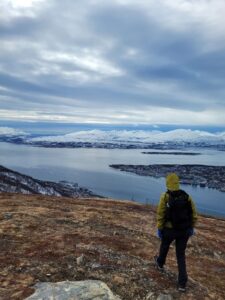
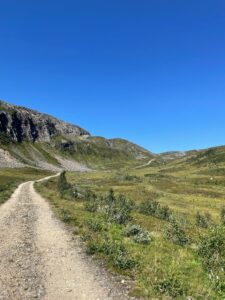
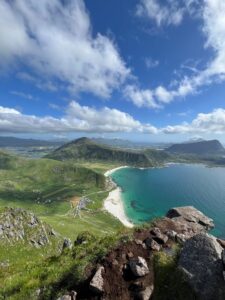
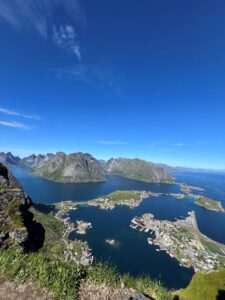
© Charlotte Hopp
If it is raining, I enjoyed reading a lot. And that have been my last five months: Hiking, exercising, reading, baking. My family visited for two weeks, in which we went on a road trip to the Lofoten and Vesteralen islands. This vacation I will remember dearly. Of course, friends of mine visited now and then – this was a welcome disruption from everyday life. But I must admit that nowadays it is easy to stay in touch. Being 3000km away from Aachen, I learnt that deepening friendships and fostering my relationship can sometimes be easier even when apart.
I am writing this report one day prior to leaving Norway. It has been a wonderful time, helping me finding an answer to the one question that made me consider a research internship in the first place: “Do I want to do a PhD?” My answer: “Yes, but not abroad!” Additionally, I would like to say a big thank you to the Erasmus office that made my whole stay possible. Thanks for your support, organizing everything neatlessly and being reliable throughout the whole stay.
My experiences in Trondheim, Norway
- Business Administration and Engineering Materials and Process Engineering, M. Sc.
- Trondheim, Norway
- NTNU Trondheim
- 01.04.2022 – 31.05.2022
My experiences:
I am solely responsible for the content of this report.
During my master thesis which I am writing in collaboration with the NTNU in Trondheim and RWTH in Aachen I spent two months in Trondheim.
Preparation
Since I was already in Trondheim the semester before as an exchange student, I was quite familiar with the city, university as well as with the application procedure. During my exchange semester I attended the course MFA I (Material Flow Analysis) with Prof. Müller and decided to write the upcoming master thesis together with him and the RWTH.
After gathering some information, the application was very easy and quick. The next step was then the application/registration at the NTNU to get the student rights etc. and to be also able to apply for student accommodation through SIT (the organisation which provide the accommodations and other things in Trondheim). I received the confirmation of both in time so I could plan all the rest.
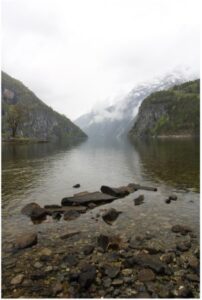
© Moritz Langhorst
Office routine
During the two months I felt very welcome at the department and was able to work in the study room with all the other students writing their master thesis. This was a good way to get to know them and to see on which topics the other students and researchers in the group are working. My weekly meetings with my supervisors could now also take place in person, which was very helpful for the working progress. I could also participate in the regular group meetings of the research group where the researchers of the group are presenting their work.
Leisure
Because I still knew some people from my exchange semester, it was very easy to find a lot of activities for the time besides the thesis. On weekends we went on a lot of cabin trips in the surrounding area, spent evenings on the fjord to watch the sunset, went bouldering or in bars. Trondheim has especially for students a lot to offer. A very nice coincidence was that the 17th of May, which is the national holiday in Norway, was in my time in Trondheim. This was a perfect opportunity to get to know the Norwegian culture, starting with a brunch and parades in the city.
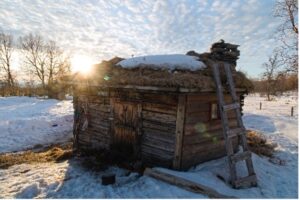
© Moritz Langhorst
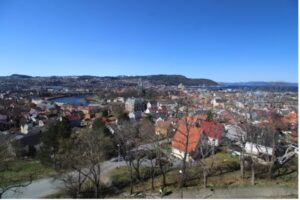
© Moritz Langhorst
My research stay in Oslo
- Chemistry M.Sc.
- Norway, Oslo
- Universitetet i Oslo
- 12.09.21-12.03.2022
Over the course of my studies, played with the idea of doing an exchange, though, for various reasons, I never went through with it. With the end of my master’s degree approaching, I decided to make use of this last chance and to complete my master thesis during a research stay at a university in another country. The planning for this started in May 2021, at the height of the second COVID wave. This narrowed my choice of countries down to all of Scandinavia, since the situation there was somewhat calm, though at this point the borders were still closed, and it wasn’t clear when they would open again. Nonetheless, I started planning.
After looking at all the major universities in Scandinavia, I found that UiO (Universitetet i Oslo) and UiB (Universitetet i Bergen) did interesting research that aligned well with my qualifications, but also with skills that I still wanted to acquire or improve. After contacting a professor at each university by e‑mail, Prof. Tilset from UiO was able to accommodate me for an interesting project in the desired timeframe.
At first, I tried to find housing privately on finn.no (Norway’s equivalent to eBay), but as a foreigner, a male, and someone staying for a mere few months, it is very difficult to find a place in shared accommodation. Thankfully, the Department of Chemistry offered to apply for researcher housing for me. Most of the student housing in Oslo is run by SiO (Studentsamskipnaden i Oslo og Akershus), a student welfare organization. Their housing is well-maintained and somewhat modern, though as a researcher you pay 20% more rent than students. Electricity, water, and internet access are included in this. This is still cheaper than the very expensive private housing in Oslo. I paid 4800 NOK in rent for a room with a shared kitchen (6 people), which is about 480 €. Having to pay more as a researcher was a recurring theme for my stay in Oslo, since I mostly didn’t get student discounts. As another bonus, you get housed with other students of Oslo’s universities, so you have ample opportunities to make friends. On the day of your arrival, it might make sense to make use of the hourly Ikea shuttles, which take people from the city centre to one of two Ikea markets (free of charge). This lets you buy the necessities for your room/apartment conveniently. The location and departure schedule can be found on Google Maps.
When staying in Norway for more than 9 weeks, it is mandatory to register with the police, where (if you’re an Erasmus intern as opposed to an Erasmus student) you have to document that you have enough money to support yourself (e.g. savings, the equivalent of 180.000 NOK per year, or less if you’re staying for a shorter time), a valid national identity card/passport and private health insurance. I did not know of the latter, but the worker at the police was kind enough to register
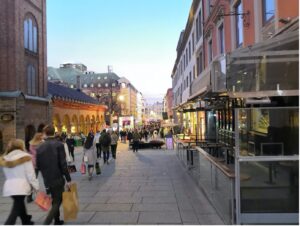
© Heiko Schiefer
me as a student when I showed her the signed agreement of the three parties and proof that I received funding from Erasmus (in my case a bank statement).
Oslo has good public transportation (Metro, Tram, Busses, and Boats), but the normal monthly ticket (800 NOK) unfortunately is constrained to the city limits, which nonetheless should cover most of your trips. Extensions can be bought in the public transportation company’s app, Ruter.
Since you will be paying in NOK, it also makes sense to open an account with a bank that charges no fees for paying in foreign currency, e.g., DKB. Credit cards are universally accepted, so there is little reason to carry cash.
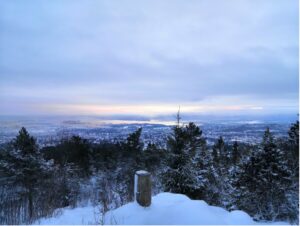
© Heiko Schiefer
For leisure activities, the Norwegians are generally very fond of the outdoors, so popular activities are ice skating, skiing, or hiking, sometimes combined with a picknick. Outdoor equipment can be borrowed free of charge at one of the many Bua’s (a non-profit organization) around Oslo. During the winter, many people sit around campfires around lake Songsvann or atop the Vettakollen mountain. These are also nice places to try and get a glimpse of the northern lights. The Norwegian trekking association (DNT) organizes trips (e.g. mushroom picking or hiking) and rents out cabins for cheap. If going out to eat is more your thing, Oslo Street Food is worth recommending. It’s a cozy food court with lots of selection, but don’t expect to be served large portions.
Here it should be mentioned that the selection of vegetarian food is more limited in Norway than in Germany, and vegan food even more so. If you’re a big partygoer, beware: Alcoholic beverages are very expensive in Norway, and only sold until 8 pm. Anything over 4.7% is only sold in the state-run Vinmonopolet shops. If you’re more culturally inclined Oslo’s many museums might be of interest.
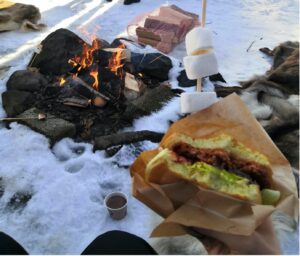
© Heiko Schiefer
Because I did not need to attend any courses, I could focus solely on my research and enjoyed lots of autonomy. The university is generally well equipped. I had my own lab bench and fume hood in a large lab with 5 other researchers (Bachelor/master students, PhDs, and a post-doc), as well as a desk in a shared office. Approximately half of the researchers were Norwegian, the other half from all over Europe. The direction and progress of my research was evaluated in weekly talks with my supervising Professor. In addition to that, there were weekly group meetings and biweekly section meetings, were people would present their research and the rest would give feedback/ask questions. The working climate was very pleasant, and I spent hours talking to fellow researchers about their or my research.
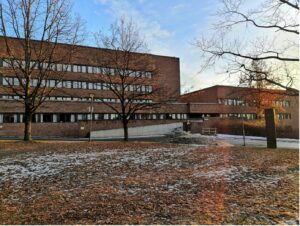
© Heiko Schiefer
In conclusion, my time in Oslo was a great experience, both professionally and personally. I got to do research abroad, acquired new skills, and refined those I already had. I met lots of new people and made friends and memories. While the cost of living is certainly high in Oslo and coming to Norway as an intern is associated with some challenges, the experience was certainly worth it.

